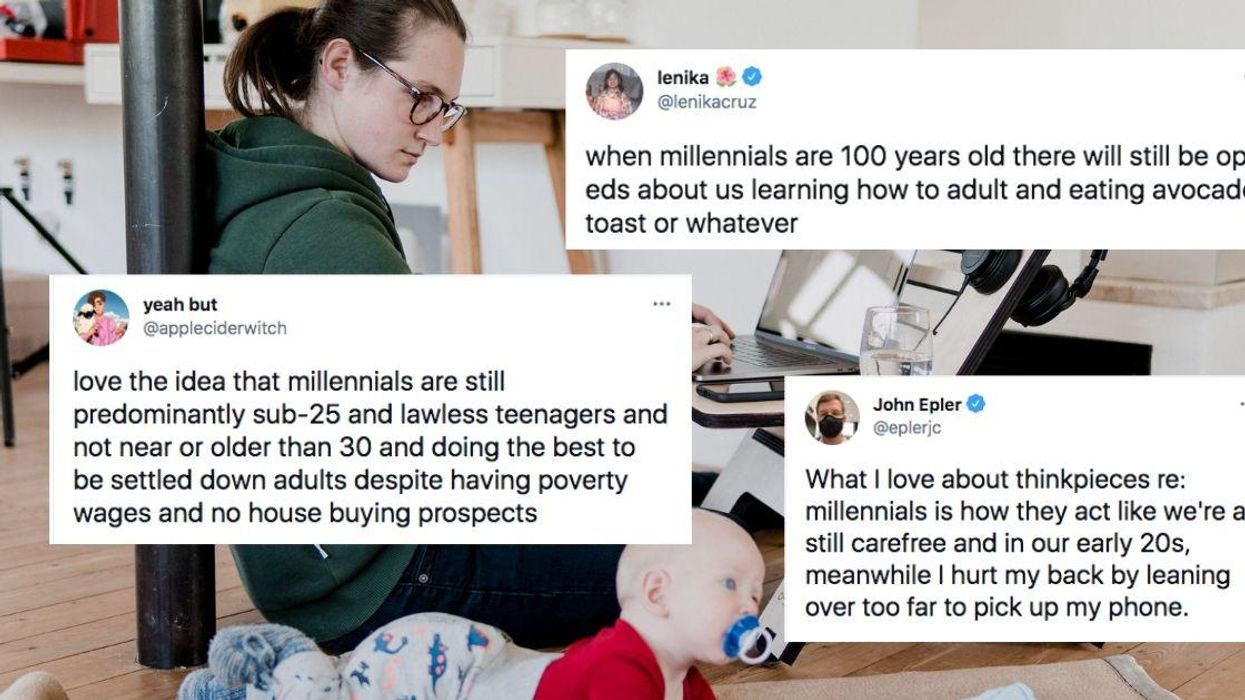
The battle between millennials and older generations isn’t exactly a generational war—it’s more a case of mistaken generational identity. A decade ago, whining about millennials being young adults unprepared to make their way in the world at least made sense mathematically. But when people bag on millennials now they end up looking rather foolish.
A marketing researcher with a doctorate in social psychology wrote an op-ed for the Chicago Tribune titled “Post-pandemic, some millennials finally decide to start #adulting.” And when the Tribune shared it to Twitter, their since-deleted tweet read, “Writer Jennifer Rosner predicts COVID-10 lockdowns will force easy-breezy millennials to grow up.”
Hoo boy.
Interestingly, the writer of the op-ed is a millennial herself, but she repeats generalizations about her entire generation that seem like they mainly apply to her own social circle. Read it yourself to decide, but regardless, the tweet of the op-ed itself set off a firestorm of responses from millennials who are tired of being painted as irresponsible young people who don’t know how to “adult” instead of what they actually are.
@chitribopinions Seems like you called an entire generation “easy-breezy” and got ratioed. https://t.co/sYuVcenUKf— Claude Walker (@Claude Walker)1619056810.0
First of all, the oldest millennials are turning 40 this year The youngest are 25—either well out of college or well into grad school. And yet, they’ve been thought of as the youngest adults for the past 10-15 years, even as they’ve aged into full-on adulthood.
they call us millennials because we’ve been alive for a thousand years— Matt Pearce 🦅 (@Matt Pearce 🦅)1619044930.0
The struggle of millennials is not that they don’t know how to be adults. It’s that the financial reality of the world in which they came of age made it much harder to get established than previous generations, with two recessions, stagnant wages, rising costs of living, and crippling debt from skyrocketing tuition costs.
the oldest millennials are 40. the youngest millennials are 25. these op-ed columnists need to get a fucking grip a… https://t.co/2aQXbY364Q— Jeanna Kadlec (@Jeanna Kadlec)1619026617.0
easy breezy means, “everything I have will be blown away with a big enough medical bill”— yeah but (@yeah but)1619024172.0
Nonetheless, most millennials are 30-somethings who are in the midst of careers, paying mortgages, raising kids, and other extremely adult things. And they’re doing it with less security and stability on a basic level than previous generations experienced. They are resilient because they have to be. They are resourceful because they have no choice.
What they, as a generation, are not? Easy breezy.
@chitribopinions The pandemic rolled in, and Boomers lost their collective minds, screaming at grocery store worker… https://t.co/YoukFrq6r4— Cate Eland (@Cate Eland)1619023974.0
A good chunk of the parents who have had to figure out childcare for their young kids during a pandemic or learn on the fly how to help their children with virtual school while also managing their own careers from home? Millennials.
@tindsaylurner This is also another great example of people not realizing that millennials are 35, and are the peop… https://t.co/CbYkZS7TGX— Emily Galvin-Almanza (@Emily Galvin-Almanza)1619018717.0
Seriously, the oldest millennials were early in their career years when the 2008 recession hit, and the youngest millennials are at that stage now, during this pandemic recession. Those lucky middle-millennials may have had an easier time finding a job—maybe—but they’re still dealing with wages that haven’t kept up with costs of living increases while trying to getting their families started.
“Easy breezy millennials” got hit with the worst job market since the Great Depression bc government let Wall Stree… https://t.co/7Yrh0oqh7N— Walker Bragman (@Walker Bragman)1619030587.0
Oh yeah, and they’re inheriting a crescendoing global climate crisis to boot. Easy breezy!
The millennial curse is seeing that the tracks are out, having nobody listen, and being too late to stop the train anyway…— Walker Bragman (@Walker Bragman)1619030911.0
The responses were swift and fierce.
Well, everyone is entitled to their opinion.Excuse my millennial self while I go back to cramming a days’ work b… https://t.co/SR2EylXe83
— Jonathan Wong (@Jonathan Wong)1619047740.0
And some of them were simply, wryly hilarious.
@chitribopinions Once again, “millennial” is not a synonym for “cohort of young people I don’t like.” Millennials a… https://t.co/2tAVqig0Fe— James Greene (@James Greene)1618926015.0
me: *is dead*them: look at this lazy ass coddled childless millennial who never bought a house just lying there
— lenika 🌺 (@lenika 🌺)1619030969.0
@tylerevansokay @Learnonaut The year is 2045. A millennial, on the first day of retirement, opens the News app on h… https://t.co/s2ZcXRLKCm— Steve Watts (@Steve Watts)1619020896.0
@chitribopinions Seriously, the “Millennials are young and irresponsible” narrative is as old and tired as Millennials themselves— John Stone (@John Stone)1618983267.0
What I love about thinkpieces re: millennials is how they act like we’re all still carefree and in our early 20s, m… https://t.co/8l4DnUTRYi— John Epler (@John Epler)1619026065.0
how millennials actually live https://t.co/JA0lWDYy05— Allison Kilkenny (@Allison Kilkenny)1618936208.0
Every generation has its share of struggles and every generation thinks the generation before and after it is somehow flawed, but it’s those generalizations themselves that are the biggest problem. Sure, there are generational differences born of changes in the world, social pendulum swings, and reactions to our own upbringings, but to blame a generation for circumstances they can’t control is pretty crappy and to lump them all together as lazy or entitled or “easy breezy” is as inaccurate as it is rude.
I’m not a millennial—solidly Gen X here—but the millennials I know are great people. Leave them alone unless you’ve got a solution to the challenges they’re facing beyond “stop buying avocado toast” and “save up money from your underpaid job for a house you can’t afford.” And for the love of all that is good and holy, stop talking about them like they’re doe-eyed college students. Time to give them the full respect we give all “real” adults. They’ve definitely earned it.
